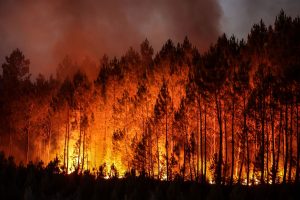Umamah Bakharia
Extreme heat has been the reason for the recent wildfires that have been raging through parts of Europe. Roads have been closed while thousands had to be evacuated from their homes.
On Sunday alone, Portugal and Spain reported more than 1,000 heat-related deaths.
While firefighters are trying to extinguish the fires by dropping after from helicopters, there has been little to no luck in stopping the fires. Currently, Europe is dealing with its third heat wave of the summer, which is fuelling devastating wildfires and threatening millions of people.
In France, thousands of people fled wildfires while according to Sky News, one United Kingdom airport suspended flights after its runway melted. Wales also recorded its highest temperature ever. UK meteorologists expect still higher temperatures on Tuesday.
“The likelihood of getting a heat wave is increasing simply because it’s warming. And that’s happening pretty much anywhere across the globe,” says Deepti Singh, a climate scientist at Washington State University.

Heatwaves are becoming increasingly common as global temperatures rise. Scientists are warning that this could become the norm across the world.
“There needs to be kind of a shift in the perception of what a heat wave actually means, that the heat wave is not some fun day at the beach, but that it’s potentially dangerous to health,” says Kai Kornhuber, a climate physicist at Columbia University.
Scientists say that cities should prepare for the worst by means of increasing greenery, providing residents more shade and covering surfaces like asphalt, which heats up significantly in direct sunlight.







0 Comments